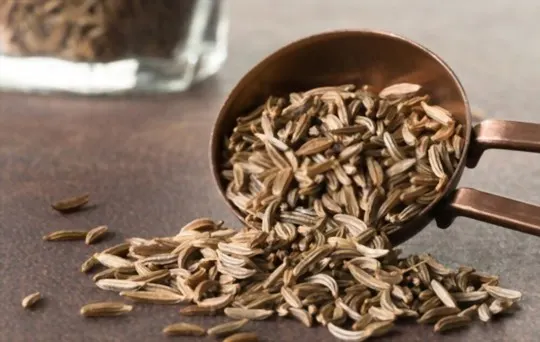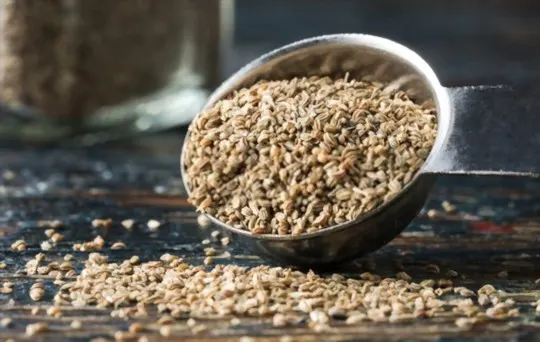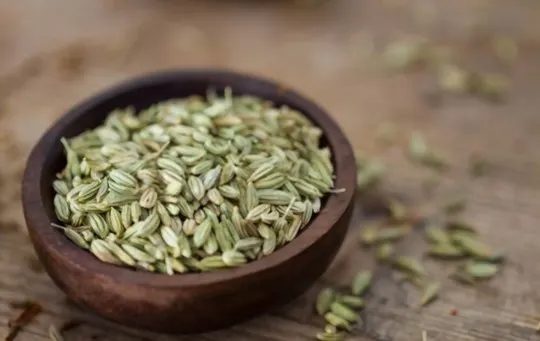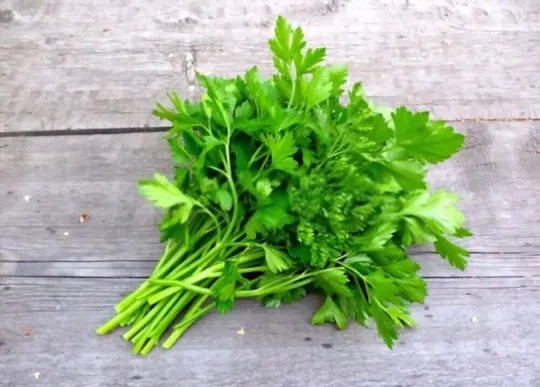Finding the perfect angelica root substitute feels like a kitchen treasure hunt, doesn’t it?
We’re here to guide you through it. This herb packs a punch with its earthy, sweet vibes, making dishes come alive.
But sometimes, it hides just out of reach in our pantries. No stress, though. Our little list?
It’s a goldmine of flavor-packed alternatives that’ll save the day.
Each one brings something special to the table, promising to keep your meals exciting.
Stick with us, and you’ll be swapping ingredients like a pro in no time, keeping that apron on and the magic happening.

The 5 BEST Substitutes for Angelica Root
From herbs to spices and even vegetables, these picks can easily help you achieve the same flavor as angelica root without all the hassle of finding an elusive ingredient.
Here are our top recommended substitutes for Angelica Root:
1 – Caraway Seeds

Caraway seeds have an interesting flavor profile and have recently become a buzz-worthy item.
Their nutty, sharp, and slightly peppery taste profile makes them incredibly versatile in different sorts of dishes; in fact, caraway is widely used in European culinary traditions, including bread like rye bread and German-style pretzels, as well as pumpernickel.
Additionally, they can be a wonderful accompaniment to sauerkraut.
The dried seeds are fairly small, with a unique twisted shape that makes them recognizable; their color ranges from tan to dark brown.
Caraway seeds have an interesting texture, with a crunchy exterior that opens up to reveal softer insides when you bite into it.
In some kitching contexts, caraway is an interesting substitute for angelica root due to similar earthy tones and crunchiness; however, when substituting caraway for angelica root, it’s recommended to take care not to overdo it due to the strength of caraways flavors.
2 – Celery Seeds

Celery seeds often go overlooked in the kitchen because of their small size and unassuming flavor profile.
But don’t be fooled – these little jewels pack a punch.
The taste is slightly bitter and earthy, with a hint of citrus that lingers on the tongue.
They also have an unexpected crunchiness, providing an interesting texture to your dishes.
When looking for a substitute for angelica root in recipes, celery seeds are a great option – they bring a similar flavor without any of the added hassles.
With this little seed, you can add unique flavor and texture to soups, stews, or roasted vegetables alike.
So don’t pass up these tasty little seeds; they just might end up being your favorite ingredient.
3 – Fennel

Fennel, commonly known as ‘saunf’ or ‘shombei,’ carries many health benefits.
Apart from having high nutritional values such as minerals, proteins, and dietary fibers, it has also been used as a medicinal plant for thousands of years.
It has a sweet and comforting licorice-like aroma that smells like anise when cooked.
This sweet, unmistakable flavor works well with fish, sausage, and pork dishes and can even be sprinkled on salads for added flavor.
It is also considered to be a good substitute for angelica root in baking recipes.
Its versatility adds much-needed zest to otherwise typical meals making it one of the more popular ingredients around the world.
4 – Star Anise

Star anise is a spice belonging to the magnolia family, native to Southeast Asia.
The eight-pointed star-shaped pods of this spice contain small, intensely fragrant seeds within.
It has a robust flavor profile with notes of licorice, black pepper, and clove.
Its distinct smell and taste have made it a popular ingredient in Chinese, Vietnamese, and Indian cuisines.
Star anise can be used whole or ground into a powder form but doesn’t lose its flavor upon cooking.
Those who are looking for a substitute for angelica root may find star anise to be a suitable alternative as both have sweet, pungent, yet earthy flavor profiles that develop in intensity when cooked.
With its slightly bittersweet characteristics, star anise can take any dish’s flavor to the next level.
5 – Parsley

Parsley is an herb of the Apiaceae family, native to the Central Mediterranean area.
It’s not just known as a garnish or spice, but it also has several benefits.
Highly nutritious, parsley contains high levels of Vitamins A, B, and C, providing your body with antioxidant protection.
Its leaves have a bright flavor ranging from strong and earthy to sweet and grassy, depending on the variety.
It can be used in salads, cooked dishes, or as a garnish, and its texture ranges from crisp to soft.
If you’re looking for something to substitute its milder sister Angelica root, parsley will be more than enough with its bursting flavor.

Leave a comment